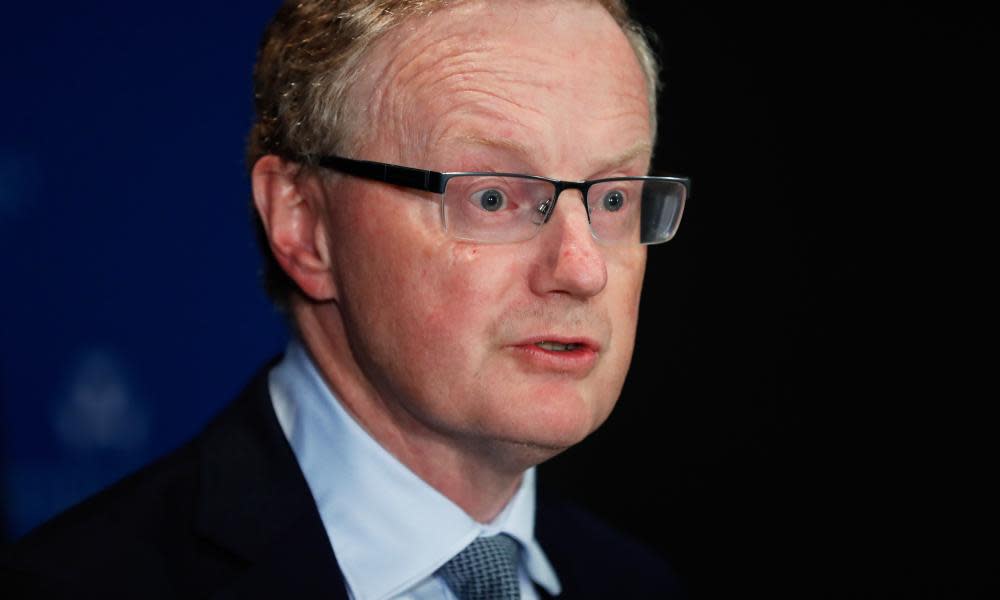Scrapping jobkeeper too early risks Australian economy falling off a cliff, Covid inquiry told

The governor of the Reserve Bank has warned the government the jobkeeper program may need to be kept going beyond its current cut-off date to avoid the Australian economy falling off a cliff.
Statements made by the RBA governor, Philip Lowe, and the Australian Prudential Regulation Authority chairman, Wayne Byres, about the risk of economic collapse when the jobkeeper program expires at the end of September will increase pressure on the Morrison government to defy a ginger group of Coalition backbenchers and extend stimulus into the new year.
Appearing on Thursday before a Senate inquiry into the government’s response to the coronavirus crisis, Lowe said it was “too early” to say what the economy would look like in four months’ time.
Related: 'The cliff': what happens when Australia's coronavirus stimulus runs out of road?
“But if we have not come out of the current trough in economic activity, there will be, and there should be, a debate about how the jobkeeper program transitions into something else, whether it’s extended for specific industries, or somehow tapered,” he said.
“I think it’s very important we don’t withdraw the fiscal stimulus too early.”
Lowe said the economy was performing slightly better than previously thought, but jobless numbers in the hundreds of thousands were still shocking.
He said sectors hardest hit by the initial coronavirus shutdown, such as hospitality and retail, were showing signs of recovery but the pipeline of work in other areas such as construction and professional services that have so far kept going was beginning to dry up.
The RBA had earlier predicted a 20% fall in hours worked by employees across the economy, but Lowe said this had now been revised to 15% – still a “staggering” fall.
“We will see further declines in jobs,” he said. “They will not be as stark as the declines we saw in April. I think the worst of it was the period up until mid- to late-April. Since then, there has been some stabilisation.”
Email: sign up for our daily coronavirus newsletter
App: download it and never miss the biggest stories
Social: follow us on Facebook, Instagram or Twitter
Podcast: listen to our daily episodes on Apple Podcasts, Spotify or search "Full Story" in your favourite app
Byres told the committee that $60bn in loans had been approved under a scheme that deferred repayments on small business borrowing for six months. Half of the loans are guaranteed by the government and half by the banks.
Banks have also deferred repayments on $250bn in other loans, mostly residential mortgages, Byres said.
Asked by the Labor senator Murray Watt what the risk to banks and the economy was when deferral schemes all ended at the same time, Byres said it was hard to tell.
“We often talk about the cliff, when everything ends in six months’ time. No one has an interest in going off the cliff, so we have to work out what the next phase will be. I think the risks are there whether the loan deferral schemes end or not.”
Related: Work in progress: a $60bn miscalculation could make jobkeeper fairer and lead to quicker recovery
The health minister, Greg Hunt, said that there would be a review of the jobkeeper program next month and would not “try to foretell or foresee the future”.
“But the prime minister has said that all of these measures are temporary measures to get Australia through,” he said. “That principle remains the case. The review is something where he’ll be looking at the needs.”
The shadow treasurer, Jim Chalmers, said the “sudden withdrawal of support for the economy in the last week of September makes no sense at all”.
“The Morrison government’s lack of a plan for the months and years ahead means the downturn will be deeper than necessary, the unemployment queues longer, and the recovery more difficult,” he said.
“The less done to protect jobs and support vulnerable workers, business and communities in the coming months, the harder and longer the recovery will be.”

 Yahoo News
Yahoo News 
